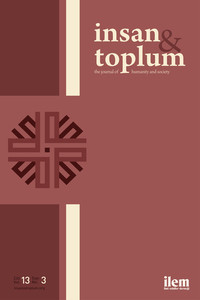Abstract
The epistemic crisis of politics leaves us between two options when it is evaluated in terms of political epistemology: (i) Limiting the talking about the idea of good by claiming that it is impossible to design the public sphere as an epistemic one where political actors can negotiate and compromise on every issue. Or (ii) Settling for the minimum by claiming that it is impossible to build epistemic trust between the parties in the public sphere. The first option argues that negotiating the ideas about good and well-being will eventually lead to conflicts, so this option suggests that keeping quiet about the good would be suitable choice for security reasons. The second option indicates that as long as the problem of mutual epistemic trust between individuals is not resolved, it would be more reasonable to settle for less. However, no matter which of these two options is chosen, it does not seem to be possible to get away from epistemic vices such as epistemic arrogance, epistemic injustice and mythical thinking that deepen the crises of the politics. As far as ignorance of idea of good increases epistemic vices deepen. Epistemic vices distort not only the cognitive process of the individual, but the entire field of politics. This study claims that political actors’ adoption of epistemic humility as an intellectual virtue will alleviate epistemic vices in politics. Humility will make it easier for political actors to realize their epistemic vices, to continue to seek the truth on the issues they are ignorant, and to exchange knowledge about the idea of good by overcoming the problem of mutual trust in deliberation processes.
References
- Tanesini, A. (2018). Arrogance, anger and debate. Symposion 5(2). 213-227.
- Tanesini, A. (2021a). Passionate speech: On the uses and abuses of anger in public debate. Philosophy (Supplementary vol.) 89, 153-176.
- Tanesini, A. (2021b). Ignorance, arrogance, and privilege: vice epistemology and the epistemology of ignorance. I. J. Kidd, H. Battaly & Q. Cassam. Vice epistemology: theory and practice içinde (ss. 68-53). Routledge.
- Tuana, N. (2006). The speculum of ignorance: The women’s health movement and epistemologies of ignorance. Hypatia, 21(3), 1-19.
- Walzer, M. (1984). Liberalism and the art of separation. Political Theory, 12 (3) 315-330.
- Williams, D. (2021). Motivated ignorance, rationality, and democratic politics. Synthese 7827-7807 ,198. https:// doi.org/10.1007/s11229-020-02549-8.
- Wolfe, A. (2011). Political evil: what is it and how to combat it. Alfred a. Knopf.
Abstract
Siyasette epistemik kriz, politik epistemoloji açısından değerlendirildiğinde bizi iki seçenek arasında bırakır: (i) Kamusal alanı, politik öznelerin her konuyu müzakere edebilecekleri ve uzlaşabilecekleri epistemik bir düzlem olarak tasarlamanın imkânsızlığından hareketle iyiye dair konuşmayı sınırlamak. Ya da (ii) kamusal alanda taraflar arasında epistemik güvenin imkânsızlığından hareketle minimuma razı olmak. İlk seçenek, öznelerin iyi ve iyi yaşama dair düşüncelerini müzakere konusu yapmanın çatışmalara yol açacağını iddia eder ve güvenlik açısından iyi hakkında sessiz kalınmasını önerir. İkinci seçenek, bireyler arasında karşılıklı epistemik güven sorunu giderilmediği sürece az ile yetinmenin daha makul bir tercih olacağına işaret eder. Ancak bu iki seçenekten hangisi seçilirse seçilsin siyaset alanının krizlerini derinleştiren epistemik kibir, epistemik adaletsizlik ve mitsel düşünce gibi epistemik kusurlardan uzaklaşmak mümkün değildir. Çünkü iyi düşüncesine dair bilgisizlik arttıkça epistemik kusurlar derinleşir. Epistemik kusurlar sadece bireyin bilişsel sürecini değil tüm siyaset alanını bozar. Bu çalışma politik aktörlerin epistemik tevazuyu entelektüel bir erdem olarak benimsemelerinin siyasette epistemik kusurları hafifleteceğini iddia etmektedir. Tevazu, politik aktörlerin epistemik kusurlarını fark etmelerini, bilgisiz bırakıldıkları konularda doğruyu aramaya devam etmelerini ve müzakere süreçlerinde karşılıklı güven sorununu aşarak iyi hakkında bilgi alışverişinde bulunmalarını kolaylaştıracaktır.
References
- Tanesini, A. (2018). Arrogance, anger and debate. Symposion 5(2). 213-227.
- Tanesini, A. (2021a). Passionate speech: On the uses and abuses of anger in public debate. Philosophy (Supplementary vol.) 89, 153-176.
- Tanesini, A. (2021b). Ignorance, arrogance, and privilege: vice epistemology and the epistemology of ignorance. I. J. Kidd, H. Battaly & Q. Cassam. Vice epistemology: theory and practice içinde (ss. 68-53). Routledge.
- Tuana, N. (2006). The speculum of ignorance: The women’s health movement and epistemologies of ignorance. Hypatia, 21(3), 1-19.
- Walzer, M. (1984). Liberalism and the art of separation. Political Theory, 12 (3) 315-330.
- Williams, D. (2021). Motivated ignorance, rationality, and democratic politics. Synthese 7827-7807 ,198. https:// doi.org/10.1007/s11229-020-02549-8.
- Wolfe, A. (2011). Political evil: what is it and how to combat it. Alfred a. Knopf.
Details
| Primary Language | Turkish |
|---|---|
| Subjects | Political Theory and Political Philosophy |
| Journal Section | Research Articles |
| Authors | |
| Publication Date | September 22, 2023 |
| Published in Issue | Year 2023 Volume: 13 Issue: 3 |


